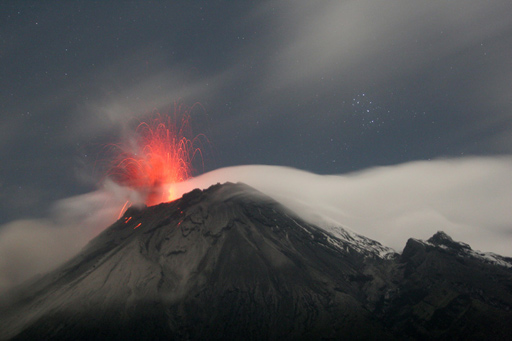Emily Lakdawalla • Sep 20, 2007
Fire fountain amid heavenly fires
Last week I received an email from a reader, Patrick Taschler, with an image attached, what he called his "once-in-a-lifetime-shot." It could almost have been the last-of-his-lifetime shot: a photo of a fire fountain from Ecuador's most active volcano, Tungurahua, exposed long enough on a moonless night to show the Pleiades in the night sky.
Driven by my love of mountains and an insatiable urge to travel, I decided to head for Ecuador. I got more than I bargained for when I arrived, because I discovered that the Tungurahua volcano, located around 80 miles south of the country's capital Quito, was about to erupt and was spewing dense smoke and lava.I approached Tungurahua from the west, which was said to be the good-weather side, since the clouds generally roll in from the east/Amazonas. The road I was on ended at Puela, a little town at the western slopes of the volcano. Night fell and the clouds dissipated and I found myself staying up all night to observe and to take pictures. I'm quite a fan of astronomy and so I realised that the star cluster M45 (Pleiades) was about to appear in the night sky on this moonless night, and that it would emerge more or less behind the crater. That's exactly what happened.
I took my picture using a Canon D20 and 70-200mm combination, with an exposure time of around 20 seconds. It was a difficult shot to take, thanks to the humidity and the fact that ash was falling fairly liberally around me; my camera is now worth half its price! The next morning I started my walk along the flanks of the volcano to reach the village of Banos: there had been a road, but much of it had been destroyed by lava flows.
The villages I passed were semi-deserted and the vegetation was covered with ash. All the time what really scared me about the volcano was that it was so quiet, with no explosions. I feared that something was building up. Time, I told myself, to get out of here!
The following night the villages of Bilbao and Penipe suffered heavy damage and those of Chilibu, Chogloctuz and Palitagua were wiped out.
Support our core enterprises
Your support powers our mission to explore worlds, find life, and defend Earth. You make all the difference when you make a gift. Give today!
Donate

 Explore Worlds
Explore Worlds Find Life
Find Life Defend Earth
Defend Earth


